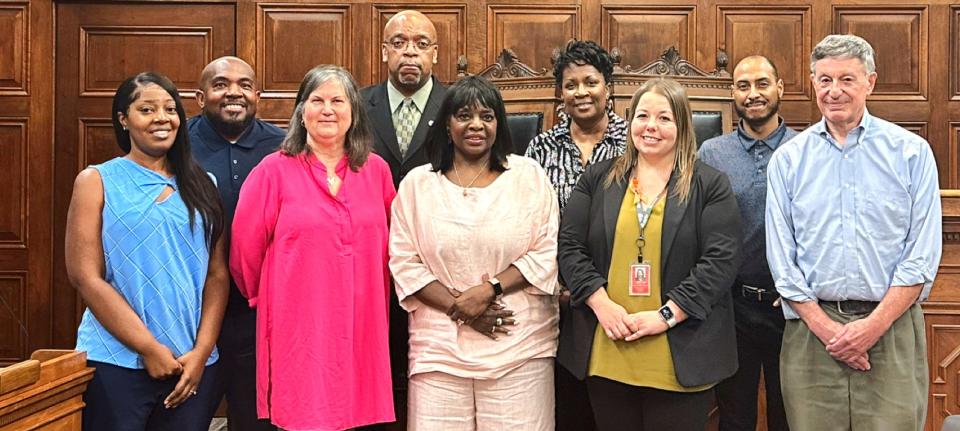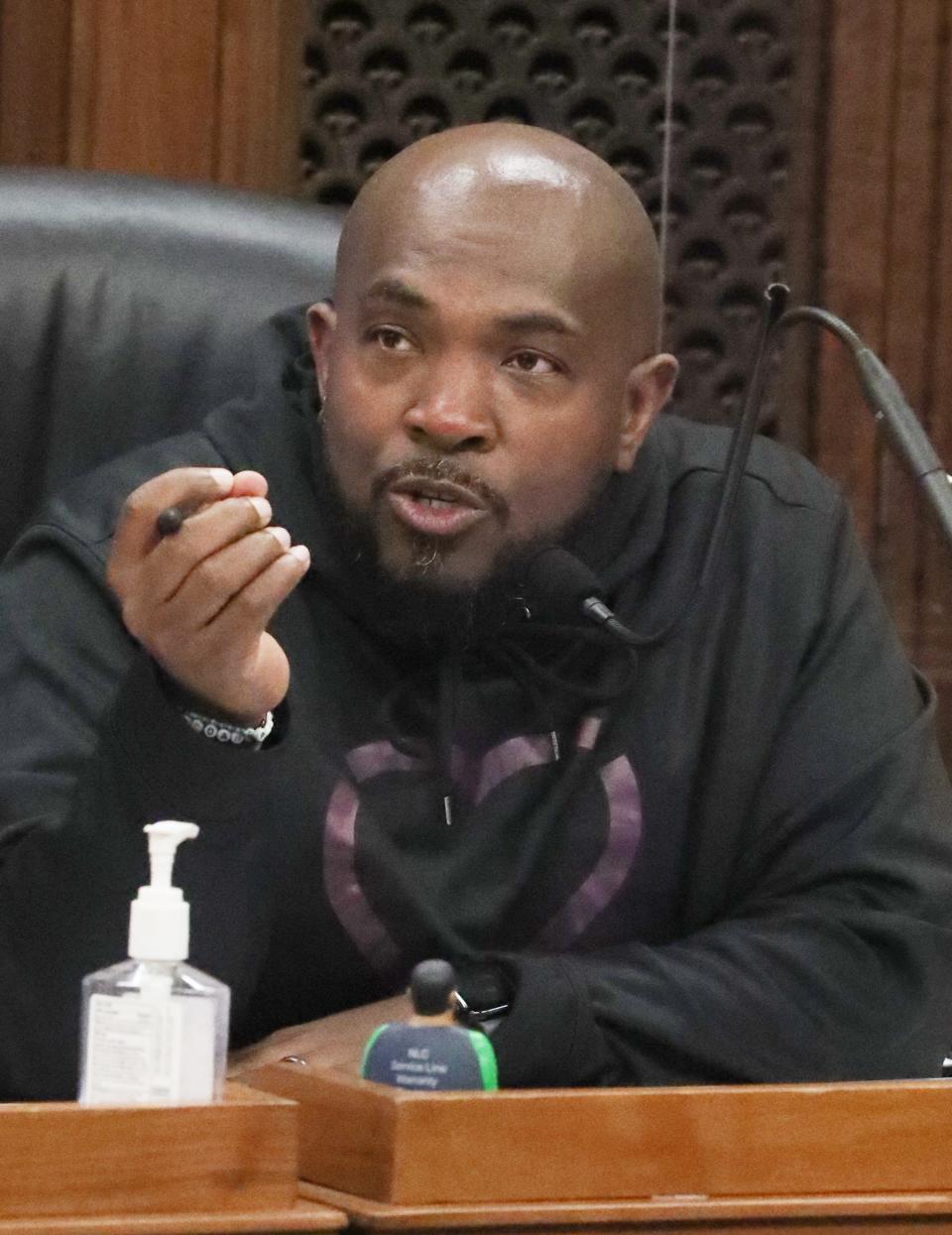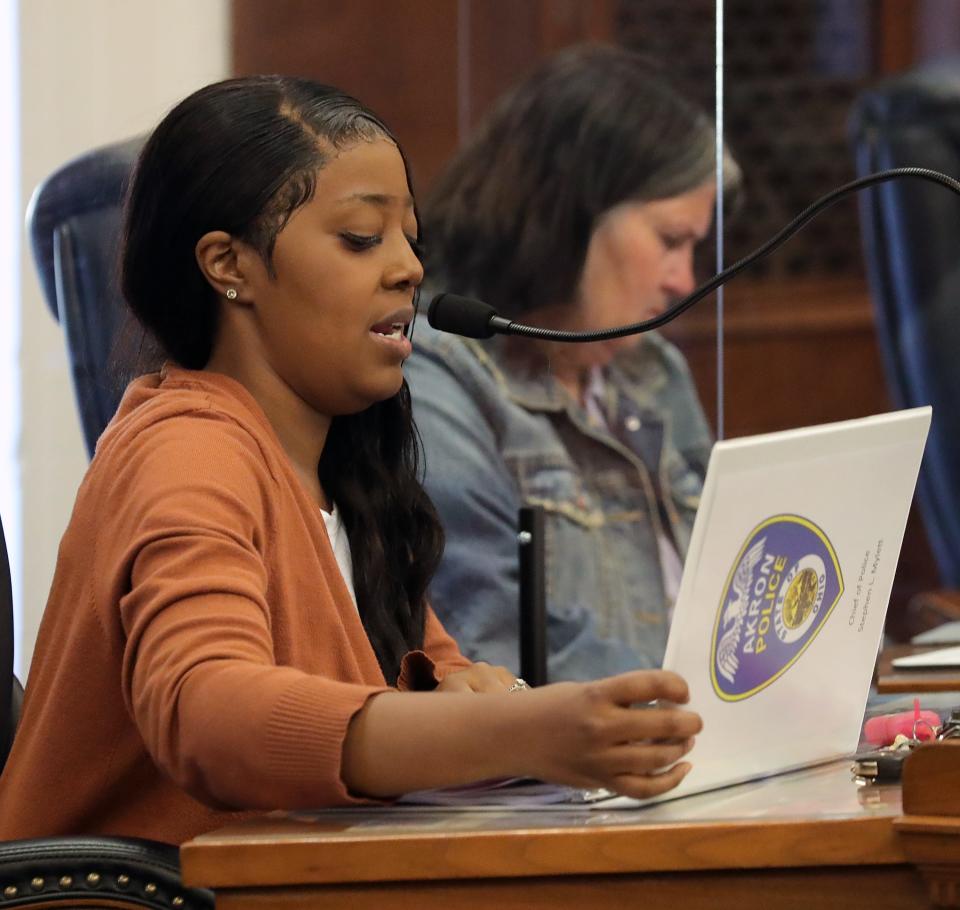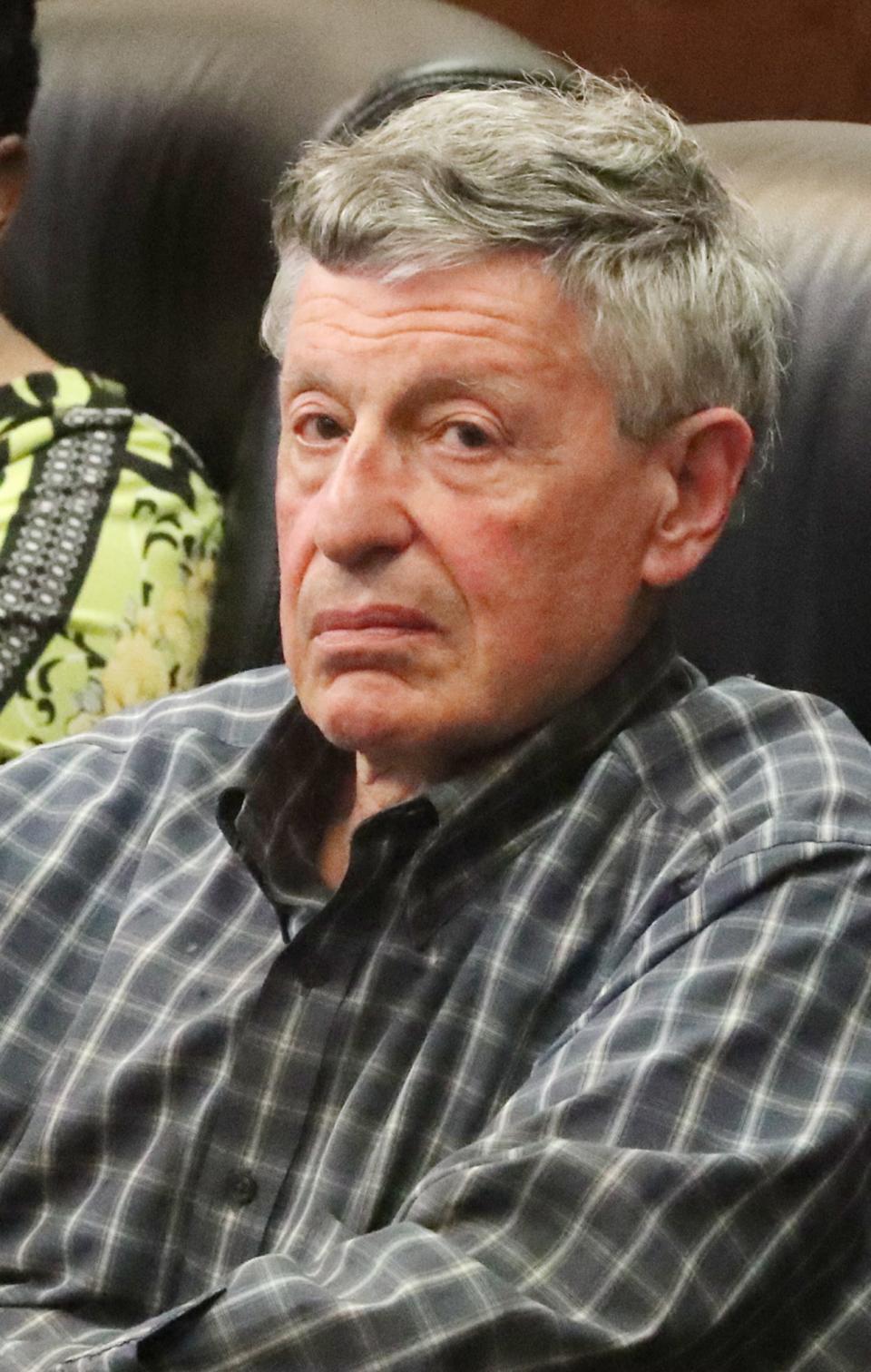Why Akron's Citizens' Police Oversight Board still can't launch investigations

For a variety of reasons, some beyond anyone's control, there's less police scrutiny in Akron today than nine months ago when voters overwhelmingly approved the creation of an independent Citizens' Police Oversight Board.
The Akron Law Department still hasn't drafted legislation that would put the founding rules of the board up for a City Council vote.
And the board, while continuing to struggle with no staffing in its police auditor’s office, can’t know or tap into the full extent of its authority to oversee policing until the rules are codified.
At the board’s last meeting, City Law Director Eve Belfance gave the board justification for going into a private executive session so she could privately offer “legal advice under the charter” of the city of Akron, she said.
But what she told them behind closed doors, according to board members, had nothing to do with potential litigation or any of the other narrow exceptions that allow public bodies to remove members of the public who are otherwise guaranteed access under the Ohio Open Meetings Act. And some considered the confidential conversation as a first step toward the law department asking the board to water down its authority to avoid going to court with the police union.
Missed deadlines and a public meeting made private
Already a month behind schedule due to the politics of City Council appointing its first members, the police oversight board unanimously approved its rules July 12 after dozens of long meetings.

In accordance with the charter amendment passed by 62% of voters last year, the package of rules embraced broad investigative and subpoena powers but no requirement that the mayor or police chief accept the board's recommendations on officer discipline or improvements to police department policy.
The charter amendment, without specifying penalties for missing its explicit deadlines, also said City Council must approve all legislation pertaining to the board by June 31. President Margo Sommerville said City Council now expects to take a rules vote sometime after the legislative body reconvenes Sept. 11 following a summer recess.
When the board passed its rules, members said they expected City Council to receive and vote on them by the end of July. But in an email, a spokesperson for Akron Mayor Dan Horrigan said the board technically hadn’t requested legislation on its rules.
The mayor appoints three of the nine board members, as well as the law director. Council picks the other six members and gives the final vote on all nine appointments.
Without rules in place, let alone the staffing to carry them out, the board has no statutory authority to launch investigations at a time when the public is calling into question decades of policing patterns and practices.
Phil Young, a former Ohio State Highway Patrol officer who's been Akron's only police auditor since the position was created in 2008, has been on medical leave for several months. A newly hired administrative assistant in the auditor's office quit.
The board is preparing to sign a three-month contract to hire T.R.Fields & Associates, an Akron private investigative firm, to fill in for Young. Hiring a new administrative assistant is pending a background check run by the police department.
Board Chair Kemp Boyd said he welcomes input from the law department while trying to honor the voter-backed transparency and trust-building that define the new oversight board’s work. Notified by a reporter this week, Boyd said he planned to remedy the lack of a formal request for the law department to draft the bill, which is required of City Council or anyone sending it legislation to consider.

But some on the police oversight board are skeptical of the intervention by the law department and its use of executive sessions to discuss what they described as the city’s legislative process, not a discussion worthy of attorney-client privilege.
“I was anticipating that the only thing we were going to be discussing was whether City Council approved or denied our rules,” board member Tristan Reed said of the board's meeting last week, careful not to disclose what was discussed for 37 minutes behind closed doors. “So, when we showed up and found out that didn’t happen, we were surprised. We didn't expect to see Eve [Belfance] there and then host an executive session. I think we are looking to see what the rules are as it concerns to whether ‘legal advice’ is something that we have to take or not.”

Belfance and the law department are expected to continue the private conversation at the board’s Aug. 23 meeting, after which Boyd said the board could reconsider its rules or push them through as passed.
What happened at the last police oversight board meeting?
Police review board members spent about as much time in executive session as they did plowing through their regular agenda at the last meeting.
About 40 minutes in, Boyd asked for a motion to move into executive session.
Belfance stood up and began to leave the chambers. Then board member Bob Gippin, an attorney, asked what purpose the board could claim for removing the public.
Boyd said the board would be hearing “from our law department,” at which point Belfance turned around before the door closed behind her.
“I don’t think [hearing from the law department] in and of itself falls within one of the exceptions,” Gippin said, speaking to the narrow rules in state law that allow public bodies to meet in private. “What is the intended purpose?”
“It would be legal advice under our charter,” Belfance replied before returning to her seat in chambers as members of the public exited.
State law, which supersedes Akron's charter, allows executive sessions for "conferences with an attorney for the public body concerning disputes involving the public body that are the subject of pending or imminent court action."
The board reconvened 37 minutes later for about a minute — just long enough to adjourn.
"I really don't want to talk at all about anything in executive session," Gippin told the Beacon Journal. "And I don't know what's going to happen next."

What did Akron Law Director Eve Belfance privately tell the board?
Executive sessions are privileged time allowed by exemptions in state law to discuss sensitive matters like buying or selling property, active or pending lawsuits, or the hiring, firing and disciplining of employees.
What was discussed, according to people in the room who spoke on the condition of anonymity, was basically a civics lesson on Akron's legislative process.
"Nothing was discussed," one board member said. "So, we didn't discuss the 'whys'."
The law department, through a city spokesperson, declined an interview with the Beacon Journal.
FOP contract is sticking point
Board members said the crux of the law department's reluctance to advance their rules appears to be an opinion that they would conflict with provisions of the police union contract.
In particular, the board is seeking the authority to launch investigations or compel officer testimony.
If the board ever exercised that authority, Fraternal Order of Police Akron Lodge No. 7 President Clay Cozart and the union’s attorney, Susannah Muskovitz, previously told the board they would file a lawsuit to stop what they called “shadow investigations.” The union maintains that only its members are allowed to investigate the behavior of its members.
In an unsettled grievance filed after Chief Steve Mylett called in the state to investigate the Jayland Walker shooting, the union asserted that the state was taking work from unionized Akron detectives by handling the probe that has since concluded with a grand jury deciding not to indict the officers involved.
The city’s three-year contract with the police union expires at the end of 2024. Negotiations on revising and renewing the labor agreement should commence a year from now. Those talks will be among the toughest tasks ahead for Shammas Malik, who is presumed to become mayor in January after winning the Democrat primary in May.
Campaigning for the new oversight board, Malik noted that the existing police union contract shouldn’t "tie the hands" of citizens demanding greater transparency and accountability in policing or wanting better relations between residents and officers.
"That cannot mean that we do not pursue justice,” Malik said at a September press conference convened by criminal justice activists. “That may mean that we need to renegotiate the contract. Contracts are renegotiated all the time."
Taking care not to upset city administrators or police while committing to carrying out the will of the voters, members of the Citizens' Police Oversight Board said they’re learning as they go. They’re admittedly in a tough spot — pushed by the public for swift and strong oversight but willing to wait for more significant reform, which could mean initially settling for less investigative authority until the road is cleared of obstacles like provisions in the union contract.
"As an oversight board, we’re getting our feet under us with learning the process,” said Boyd. "We’re learning. And we appreciate the Akron Law Department guidance.”
'An overarching conflict of interest'
One legal scholar contacted by the Beacon Journal said the executive session was unnecessary but legal.
"I don’t think there was anything illegal about the law director’s actions here,” said Michael Gentithes, a professor of law at the University of Akron. “Nor do I think that it was required. There’s certainly no attorney-client privilege that needed protection from the public’s ears. But again, nothing legally prohibits this kind of side discussion, to my knowledge.”
Kent State professor emeritus and former Beacon Journal managing editor Timothy Smith agreed that Belfance gave bad advice when she asked the board to remove the public to receive her "legal advice regarding the city charter."
“You can't have a let’s-sit-down-and-talk-about-the-law conversation. Under Ohio open records and meetings laws, specifically, you can have an attorney present for discussion of pending or imminent law action," said Smith, a founding member of the National Freedom of Information Coalition and the Media Law Committee of the state bar who also created the Ohio Center for Privacy and the First Amendment at KSU.
"Threat of being sued isn’t enough to move a public meeting behind closed doors," Smith said. “That's not going to fly. You’ve got to have something on the burner. And it may not be under litigation yet, but there's got to be something more than just the remote possibility that somebody might sue somewhere.”
Smith said Belfance’s duty to protect the city from lawsuits is “an absolute conflict” when giving advice to a board that’s meant to review and investigate police policy and practice for anything improper.
“She wants to keep these people from causing trouble for the city,” Smith said. “And this board is just guaranteed to cause trouble for the city. So, they got a problem there — an overarching conflict of interest.”
Reach reporter Doug Livingston at dlivingston@thebeaconjournal.com or 330-996-3792.
This article originally appeared on Akron Beacon Journal: Akron voters demanded police oversight 9 months ago. But delays persist

